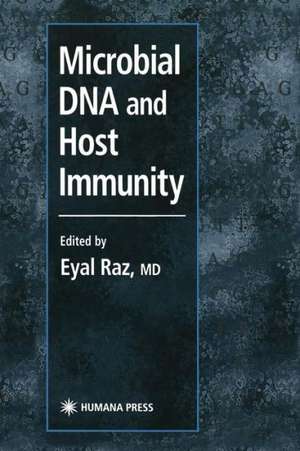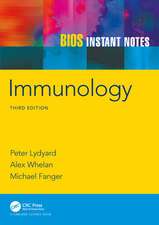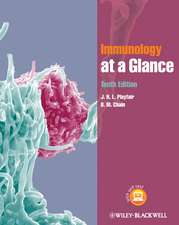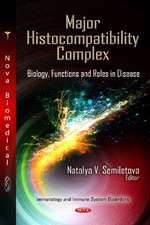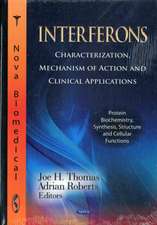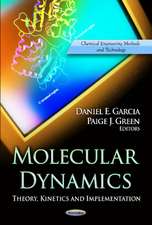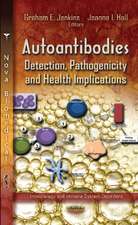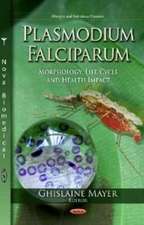Microbial DNA and Host Immunity
Editat de Eyal Razen Limba Engleză Paperback – 8 oct 2012
| Toate formatele și edițiile | Preț | Express |
|---|---|---|
| Paperback (1) | 646.75 lei 6-8 săpt. | |
| Humana Press Inc. – 8 oct 2012 | 646.75 lei 6-8 săpt. | |
| Hardback (1) | 654.77 lei 6-8 săpt. | |
| Humana Press Inc. – 26 sep 2002 | 654.77 lei 6-8 săpt. |
Preț: 646.75 lei
Preț vechi: 760.88 lei
-15% Nou
Puncte Express: 970
Preț estimativ în valută:
123.77€ • 128.74$ • 102.18£
123.77€ • 128.74$ • 102.18£
Carte tipărită la comandă
Livrare economică 15-29 aprilie
Preluare comenzi: 021 569.72.76
Specificații
ISBN-13: 9781468497281
ISBN-10: 1468497286
Pagini: 428
Ilustrații: XVII, 408 p. 95 illus.
Dimensiuni: 155 x 235 x 22 mm
Greutate: 0.59 kg
Ediția:2002
Editura: Humana Press Inc.
Colecția Humana
Locul publicării:Totowa, NJ, United States
ISBN-10: 1468497286
Pagini: 428
Ilustrații: XVII, 408 p. 95 illus.
Dimensiuni: 155 x 235 x 22 mm
Greutate: 0.59 kg
Ediția:2002
Editura: Humana Press Inc.
Colecția Humana
Locul publicării:Totowa, NJ, United States
Public țintă
ResearchCuprins
I: Introduction.- 1 Immunostimulatory DNA: An Overview.- 2 Historical Perspectives.- II: Receptors and Signaling.- 3 Signal Transduction Pathways Activated By CpG-DNA.- 4 A Novel Toll-Like Receptor that Recognizes Bacterial DNA.- 5 Activation of Innate Immunity by Microbial Nucleic Acids.- 6 Phosphorothioate Backbone Modification Changes the Pattern of Responses to CpG.- III: Cell Activation.- 7 Activation of NK Cell By Immunostimulatory Oligo-DNA in Mouse and Human.- 8 Regulation of Antigen Presenting Cell Function by CpG DNA.- 9 Activation of B Cells by CpG Motifs in Bacterial DNA.- 10 IFN-Dependent Pathways for Stimulation of Memory CD8+ Cells.- 11 Cross-Priming of CD8+ T Cells by Immunostimulatory Sequence DNA.- IV: Vaccination Strategies.- 12 The Th1 Adjuvant Effect of Immunostimulatory (ISS) DNA Sequences.- 13 Immunostimulatory DNA Prepriming for the Induction of Th1 and Prevention of Th2 Biased Immune Responses.- 14 Protein-Immunostimulatory DNA-Conjugate: A Novel Immunogen.- 15 Immunostimulatory DNA Sequence-Based Mucosal Vaccines.- 16 Enhancement of the Immunoadjuvant Activity of Immunostimulatory DNA Sequence by Liposomal Delivery.- 17 Immunostimulatory Sequences in Plasmid Vectors.- V: Applications—Infectious Disease.- 18 Comparison of CpG DNA with Other Adjuvants for Vaccination Against Hepatitis B.- 19 Immunostimulatory DNA-Based Immunization: Hope for an HIV Vaccine?.- 20 Immunoprotective Activity of CpG Oligonucleotides.- 21 Protective Immunity of Immunostimulatory Sequences Against Mycobacterial Infection.- VI: Applications—Allergy.- 22 DNA-Based Immunotherapeutics For Allergic Disease.- 23 Immunostimulatory DNA for Allergic Asthma.- 24 CpG Oligodeoxynucleotides in Asthma.- 25 Modulation of Allergic Conjunctivitis by Immunostimulatory DNA SequenceOligonucleotides.- VII: Applications—Cancer.- 26 CpG Oligodeoxynucleotides and Monoclonal Antibody Therapy of Lymphoma.- VIII: Inflammation and Autoimmunity.- 27 The Antigenicity of Bacterial DNA.- 28 Inflammatogenic Properties of Immunostimulatory DNA Sequences.- 29 The Role of Immunostimulatory DNA Sequences in Arthritis.- 30 Effects of Immunostimulatory DNA Oligonucleotides on Experimental Colitis.- IX: Safety Considerations.- 31 CpG ODN—Safety Considerations.
Recenzii
"I am delighted, therefore to have found this book, which thoroughly reviews the field by contributions from most of the key names associated with the subject. For those not yet initiated into the tell-tale nature of ISS-DNA presented by non-self, the excellent introductory chapter by Eyal Raz(Editor) will reveal all you need to know to read the rest of the book. It summarizes the role of Toll Receptors(TLR) as sensors of infection by recognition of conserved molecular patterns in pathogenic bacteria (PAMPS), a subject very topical these days but riddled with a lot of new reference terms for the poor immunologist to contend with. This new book highlights the fact that even the ubiquitous DNA molecule has been the subject of critical censorship during evolution and has allowed the mammalian innate immune response to use subtle differences between prokaryotic and eukaryotic DNA to inform of bacterial invasion...recommended as an excellent library acquisition, if not a departmental one." -- Immunology News
"This is a worthwhile endeavor and the book is of value. Investigators interested in the overall utility of these DNA sequences will find useful material..." -Doody's Health Sciences Book Review Journal
"This is a worthwhile endeavor and the book is of value. Investigators interested in the overall utility of these DNA sequences will find useful material..." -Doody's Health Sciences Book Review Journal
Textul de pe ultima copertă
The immunostimulatory prospects of bacterial DNA have attracted the interest and attention of scientists and physicians and become a major focus in immunobiology and biomedicine. These activities are the product of immunostimulatory DNA sequences (ISS, also known as GpG motifs), which are rare in the mammalian genome. ISS were shown to enhance immunological responses and were used to confer protection to a wide variety of tumors, allergic inflammation, and infections. In Microbial DNA and Host Immunity, leading researchers review the activation of the mammalian immune system by bacterial DNA and consider the applications of ISS in clinical medicine. The authors survey the latest findings concerning the receptor-recognition and signaling pathways triggered by ISS, the process of cell activation, and potential vaccination strategies using ISS. Specific pharmaceutical applications discussed include infectious disease (Hepatitis B, HIV, and mycobacterial infections), allergy (asthma and conjunctivitis), cancer (lymphoma), and inflammation and autoimmunity (arthritis and colitis).
Up-to-date and informative, Microbial DNA and Host Immunity illuminates the immunobiology of bacterial DNA and its promise of powerful new vaccines to provide protective immunity against infections, tumors, and chronic disease.
Up-to-date and informative, Microbial DNA and Host Immunity illuminates the immunobiology of bacterial DNA and its promise of powerful new vaccines to provide protective immunity against infections, tumors, and chronic disease.
Caracteristici
Includes supplementary material: sn.pub/extras
